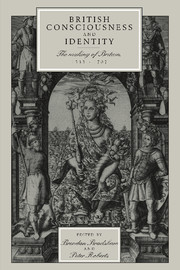Book contents
- Frontmatter
- Contents
- Notes on the contributors
- Preface
- Introduction
- 1 Tudor Wales, national identity and the British inheritance
- 2 The English Reformation and identity formation in Ireland and Wales
- 3 Faith, culture and sovereignty: Irish nationality and its development, 1558–1625
- 4 From English to British literature: John Lyly's Euphues and Edmund Spenser's The Faerie Queen
- 5 The British problem in three tracts on Ireland by Spenser, Bacon and Milton
- 6 James Ussher and the creation of an Irish protestant identity
- 7 Seventeenth-century Wales: definition and identity
- 8 Scottish identity in the seventeenth century
- 9 The Gaidhealtachd and the emergence of the Scottish Highlands
- 10 ‘No remedy more proper’: Anglo-Irish unionism before 1707
- 11 Protestantism, constitutionalism and British identity under the later Stuarts
- Index
5 - The British problem in three tracts on Ireland by Spenser, Bacon and Milton
Published online by Cambridge University Press: 15 March 2010
- Frontmatter
- Contents
- Notes on the contributors
- Preface
- Introduction
- 1 Tudor Wales, national identity and the British inheritance
- 2 The English Reformation and identity formation in Ireland and Wales
- 3 Faith, culture and sovereignty: Irish nationality and its development, 1558–1625
- 4 From English to British literature: John Lyly's Euphues and Edmund Spenser's The Faerie Queen
- 5 The British problem in three tracts on Ireland by Spenser, Bacon and Milton
- 6 James Ussher and the creation of an Irish protestant identity
- 7 Seventeenth-century Wales: definition and identity
- 8 Scottish identity in the seventeenth century
- 9 The Gaidhealtachd and the emergence of the Scottish Highlands
- 10 ‘No remedy more proper’: Anglo-Irish unionism before 1707
- 11 Protestantism, constitutionalism and British identity under the later Stuarts
- Index
Summary
While the advent of a new genre, such as the new British history, invites the study of new texts, it also encourages us to look for new angles on old ones. In recent years there has been an increasing interest among historians in the ‘British problem’. This development has been unusual insofar as no significant concomitant development has occurred in literary studies. One can speculate as to why this should be the case. Some of the presently dominant, theoretically informed approaches to literature, such as post-structuralism and deconstruction, appear to play down questions of context in favour of close reading and an assiduous attention to language that can at times come down to cavilling on the ninth part of a hair. Others which do declare themselves to be historically grounded, such as new historicism and cultural materialism, have always acknowledged Ireland as a special case, an exemplary site of colonial activity, but have preferred to set it against some monolithic Englishness or Britishness – and often the terms are interchangeable – rather than to see it as part of a complex process of state formation. In this chapter I want to focus on a genre which has long been read as concerned almost exclusively with Irish history. I shall suggest that the three texts here chosen as representative of it can usefully be considered in terms of the ‘British problem’. I should perhaps say at the outset that my interest in the so-called British problem in the early modern period is as a crisis of identity or crises of identities in Renaissance culture, and that I am particularly interested in the way in which Scotland disappears in terms like ‘Anglo-Irish’.
- Type
- Chapter
- Information
- British Consciousness and IdentityThe Making of Britain, 1533–1707, pp. 159 - 184Publisher: Cambridge University PressPrint publication year: 1998
- 3
- Cited by



